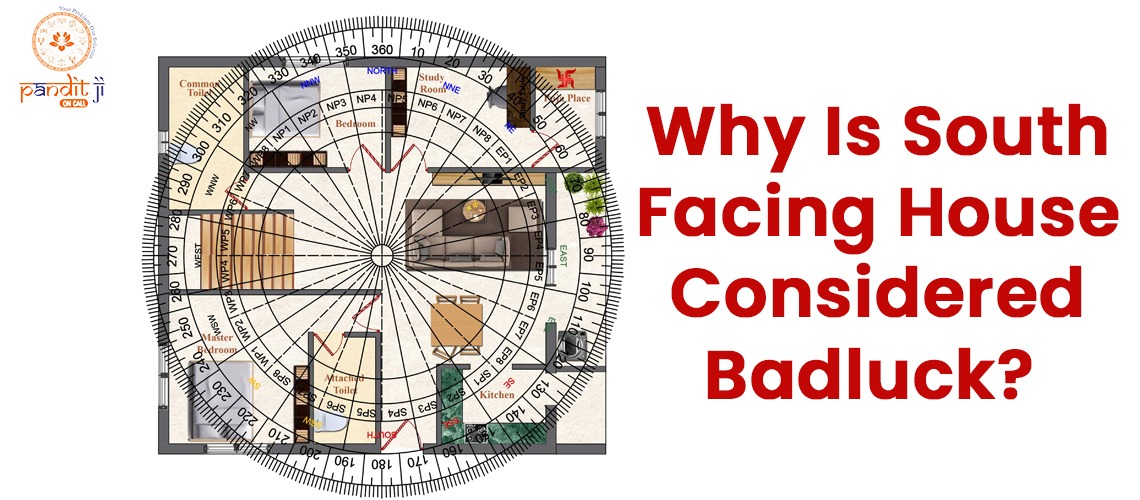
In the world of vastu shastra, the ancient Indian science of architecture and design, the orientation of a house plays a crucial role in determining its energy flow and overall well-being. Among the various factors considered, the direction a house faces holds particular significance. While each direction is associated with different energies, there is a prevailing belief in some cultures that a south-facing house is considered bad luck. In this exploration, we delve into the cultural and spiritual perspectives that contribute to this belief and seek to understand Why Is South Facing House Considered Badluck?
1. Cultural Beliefs and Vastu Shastra:
Vastu shastra, rooted in ancient Hindu scriptures, outlines guidelines for designing and constructing homes to harmonize with the natural forces and energies of the universe. Each cardinal direction is associated with specific energies, deities, and elements. In traditional vastu beliefs, the south is associated with Yama, the god of death, and is considered the direction of Pitru (ancestors). This association has contributed to the notion that a south-facing house may invite negative energies and misfortune.
Cultural Perspectives:
2. Sun's Path and Energy Flow:
Another aspect influencing the perception of south-facing houses is the path of the sun and the flow of energy. Traditional vastu shastra places great emphasis on harnessing solar energy for the well-being of the occupants. A south-facing house, due to its exposure to the sun's path, is believed to receive an excess of solar energy, which can be considered unfavorable.
Energy Flow and Vastu Shastra:
3. Practical Considerations:
Beyond cultural and spiritual beliefs, there are practical considerations that contribute to the perception of a south-facing house as less desirable. These practical aspects, rooted in climate and geographical factors, may influence the comfort and well-being of the residents.
Climate and Comfort:
Also Read : Shree Sarva Rog Nivaran Maha Yantram | Significance And Benefits
4. Psychological Factors:
Beliefs about directions and their influences on luck and well-being are also deeply rooted in psychological factors. Cultural conditioning, superstitions, and shared beliefs within a community can shape individuals' perceptions and contribute to the widespread belief that a south-facing house is associated with bad luck.
Psychological Influences:
5. Individual Experiences:
Personal experiences and anecdotal accounts can further contribute to the belief that a south-facing house brings bad luck. Stories of challenges, setbacks, or perceived misfortunes in south-facing houses may be passed down within communities, reinforcing the negative connotations associated with this directional orientation.
Shared Experiences:
Conclusion: A Tapestry of Beliefs and Perspectives:
The perception that a south-facing house is considered bad luck is a nuanced tapestry woven from cultural beliefs, spiritual associations, practical considerations, psychological influences, and individual experiences. Vastu shastra, with its ancient wisdom, has significantly shaped these beliefs, offering a framework for designing harmonious living spaces.
It's essential to approach such beliefs with an open mind, recognizing that cultural and spiritual perspectives vary widely. While some may choose to adhere to traditional beliefs, others may prioritize practical considerations or dismiss such notions altogether. Ultimately, the auspiciousness of a house is a deeply personal choice, influenced by a myriad of factors that extend beyond directional orientation.
As we navigate the rich tapestry of cultural beliefs and spiritual traditions, it becomes evident that the perception of a south-facing house as bad luck is a reflection of the diverse ways in which individuals interpret and interact with their living spaces. Whether one chooses a north-facing, south-facing, or any other direction for their abode, the key lies in creating a home that aligns with personal values, comfort, and well-being.
Connect with an Astrologer for more personalised detailed predictions. First FREE CALL.
For interesting astrology facts and videos, follow us on Instagram.